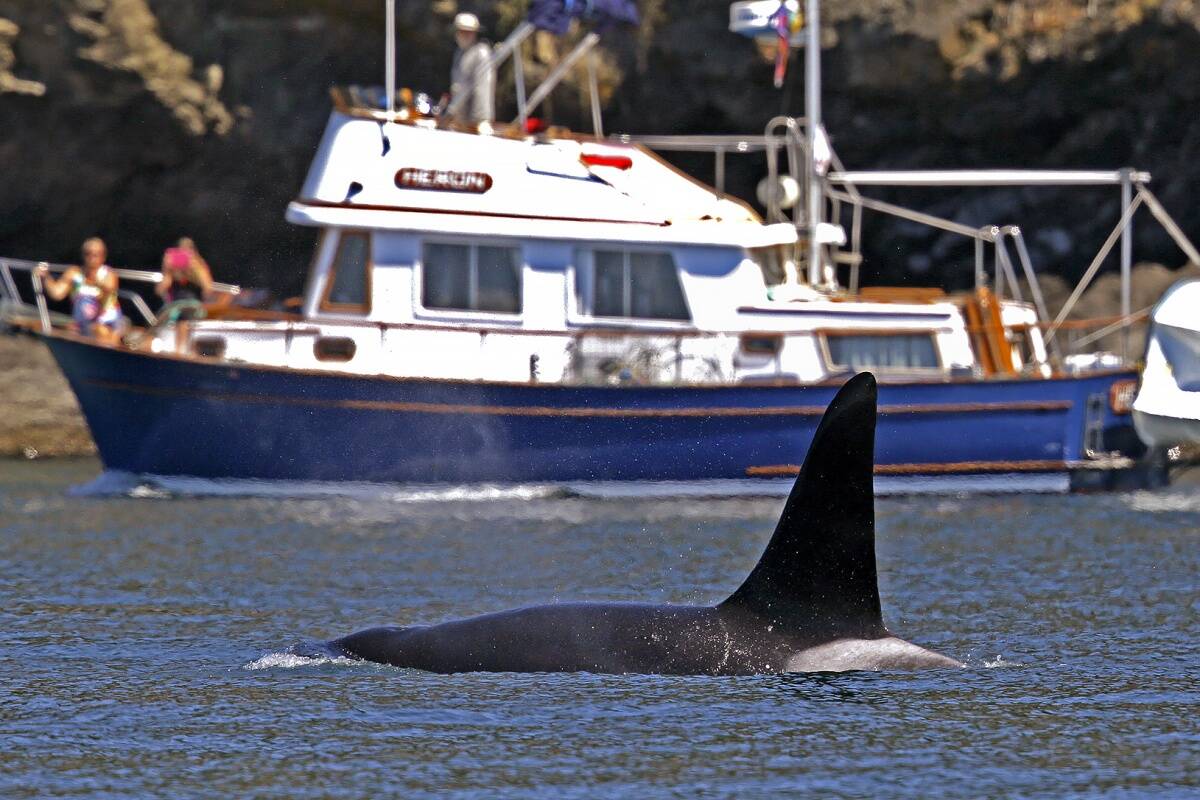Submitted by the Center for Biological Diversity.
A bill to create a 1,000-yard buffer around the critically endangered Southern Resident orcas is headed to Gov. Jay Inslee’s desk for his signature after clearing a final legislative hurdle on Monday. Senate Bill 5371 requires that boaters stay 1,000 yards away from Southern Residents, beginning in 2025.
National and regional conservation groups and environmental experts celebrated the bill’s passage and encouraged boaters to take the voluntary pledge at givethemspace.org until the law takes effect.
The Senate bill was sponsored by Sen. Liz Lovelett (D-Anacortes) and championed by Rep. Debra Lekanoff (D-Bow) during negotiations. The original House companion bill was sponsored by Rep. Liz Berry (D-Seattle).
“Our constituents have been loud and clear in voicing strong support for taking the hard but necessary steps to protect our iconic resident orcas from extinction,” said Lovelett. “SB 5371 has passed with overwhelming support and shows our commitment to the survival of these beloved creatures who are emblematic of the health of the Salish Sea. I’m proud to have worked with my colleagues to bring a voice to these animals as they fight to survive and thrive.”
The law implements a recommendation from the Washington Department of Fish and Wildlife based on recent science showing that when vessels approach closer than 1,000 yards it significantly reduces the whales’ ability to find and catch prey. The harm from noise and disturbance is more pronounced on females, who abandon hunts when vessels approach closer than 400 yards.
Currently, commercial whale-watching operators are required to stay 1,000 yards away from Southern Residents most of the year, while other boaters are allowed to approach as close as 300 yards. The new law resolves that difference. Having one distance for all boaters will give the whales the space they need to forage successfully and be easier to communicate, comply with and enforce.
The Southern Resident orca population currently consists of 73 individuals, nearing their historical low of 71. “There are seven calves under five years of age in the population, including Tahlequah’s newest calf, and five of those are female,” said Donna Sandstrom, director of The Whale Trail. “The future of the population is here. Their ability to survive and thrive into adulthood depends on the actions that we take today.”
“The legislation is a strong step forward. We are grateful to the bill’s champions from the 40th District, Sen. Lovelett and Rep. Lekanoff, as well as WDFW and the many scientists, organizations, Tribes, local governments, and members of the public who stepped up for the Southern Residents in this legislative session,” said Lovel Pratt, marine protection and policy director at Friends of the San Juans. “Public support for this bill was overwhelming.”
Boaters are encouraged to take the pledge at givethemspace.org to stay 1,000 yards away from the Southern Residents voluntarily. Nearly 200 people have taken the pledge since the campaign was launched in September 2020.
“Even though the distance requirement won’t be mandatory until 2025, there’s no reason to wait to give the whales the space they need,” said Michael Jasny, director of marine mammal protection at the Natural Resources Defense Council.
“Our goal is that every boater in Puget Sound, and through the Southern Resident orcas’ range, will take this pledge, and do their part to give the whales the space they need, even before it is required,” said Rein Attemann, Puget Sound campaign manager at Washington Conservation Action. “Boaters have a unique opportunity to play a role in the Southern Residents’ recovery, simply by avoiding them while at sea, and making it easier for the whales to find and catch their prey.”
“Making it easier for orcas to find and catch their food is one thing we can do right now to provide relief for these struggling pods. This bill will help immensely,” said Sophia Ressler, an attorney at the Center for Biological Diversity. “The Southern Resident orcas have been brought to the edge of extinction from human-caused threats including lack of prey, accumulations of poisons in their bodies, and stress and noise from vessels.”
“On the long road to recover the Southern Residents, Washington state has taken a big step forward,” said Nora Nickum, senior ocean policy manager at the Seattle Aquarium. “We encourage the federal governments of Canada and the United States to follow suit and give the whales the space they need throughout their range.”



